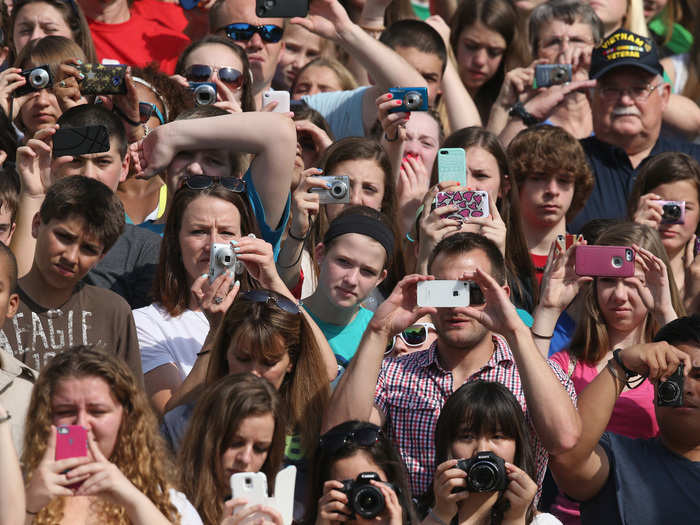
"There will be Web dial tone everywhere. And anything that's ubiquitous gets interesting."

When asked about the main beneficiaries of the web, Jobs said that it would be people who have something to sell: "It's commerce. People are going to stop going to a lot of stores. And they're going to buy stuff over the Web!"


http://www.youtube.com/embed/sICSyC9u5iI
Width: 854px
Height: 480px
"The third thing is commerce, which is even harder than complex publishing because you have to tie the Web into your order-management system, your collection system, things like that. I think we're still two years away. But that's also going to be huge," Jobs said.
There were missteps on the way, like Pets.com, which had very little revenue and went out of business in 2000.


"The best way to think of the Web is as a direct-to-customer distribution channel, whether it's for information or commerce. It bypasses all middlemen. And, it turns out, there are a lot of middlepersons in this society. And they generally tend to slow things down, muck things up, and make things more expensive. The elimination of them is going to be profound," Jobs said.
Today, startups like Casper sell mattresses directly to consumers, Warby Parker sells frames to people who need eyewear, and Kickstarter lets people support ideas they like.

"The Web is just going to be one more of those major change factors that businesses face every decade. This decade, in the next 10 years, it's going to be the Web. It's going to be one of them," Jobs said.
Seems like taxi companies, bookstores, and record companies would agree.

"It's the next big phase of the Web," Jobs said. "Have you seen the Federal Express Web site where you can track a package?"

"Take auto dealerships. So much money is spent on inventory – billions and billions of dollars. Inventory is not a good thing. Inventory ties up a ton of cash, it's open to vandalism, it becomes obsolete. It takes a tremendous amount of time to manage. And, usually, the car you want, in the color you want, isn't there anyway, so they've got to horse-trade around. Wouldn't it be nice to get rid of all that inventory? Just have one white car to drive and maybe a laserdisc so you can look at the other colors. Then you order your car and you get it in a week," Jobs explained.

Of course, Tesla's dealerships could have been influenced by Apple Stores, which were one of Jobs' projects. So obviously there's a debate as to whether Jobs predicted this or influenced it himself.

"Eventually, Microsoft will crumble because of complacency, and maybe some new things will grow. But until that happens, until there's some fundamental technology shift, it's just over."

"I don't store anything anymore, really. I use a lot of e-mail and the Web, and with both of those I don't have to ever manage storage. As a matter of fact, my favorite way of reminding myself to do something is to send myself e-mail. That's my storage," Jobs said.

"It's much like the old mainframe computing environment, where a Web browser is like a dumb terminal and the Web server is like the mainframe where all the processing's done," Jobs said.

He argued for a more drastic overhaul. Today, his widow, Lauren Powell Jobs, is one of the biggest backers of charter schools.


"The Web is going to be very important. Is it going to be a life-changing event for millions of people? No. I mean, maybe. But it's not an assured Yes at this point. And it'll probably creep up on people.
It's certainly not going to be like the first time somebody saw a television. It's certainly not going to be as profound as when someone in Nebraska first heard a radio broadcast. It's not going to be that profound," Jobs said.
11 years later, Jobs introduced the iPhone.
 I spent 2 weeks in India. A highlight was visiting a small mountain town so beautiful it didn't seem real.
I spent 2 weeks in India. A highlight was visiting a small mountain town so beautiful it didn't seem real.  I quit McKinsey after 1.5 years. I was making over $200k but my mental health was shattered.
I quit McKinsey after 1.5 years. I was making over $200k but my mental health was shattered. Some Tesla factory workers realized they were laid off when security scanned their badges and sent them back on shuttles, sources say
Some Tesla factory workers realized they were laid off when security scanned their badges and sent them back on shuttles, sources say Why are so many elite coaches moving to Western countries?
Why are so many elite coaches moving to Western countries?
 Global GDP to face a 19% decline by 2050 due to climate change, study projects
Global GDP to face a 19% decline by 2050 due to climate change, study projects
 5 things to keep in mind before taking a personal loan
5 things to keep in mind before taking a personal loan

Copyright © 2024. Times Internet Limited. All rights reserved.For reprint rights. Times Syndication Service.